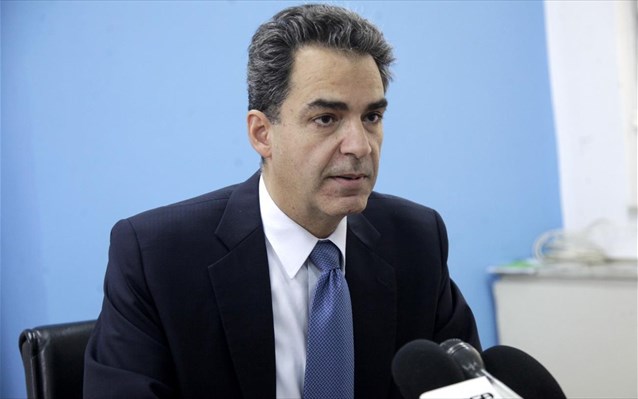Immigrants arriving by boat on the island of Lesvos on Monday morning, Photo: kathimerini.gr
Anastasia Balezdrova
The refugee flow from the Turkish coast to the Greek islands, mainland Greece and from there to Western and Northern Europe is increasingly intensifying. Another 4,000 Syrian refugees arrived at the port of Piraeus today and they will probably take the same route. According to UN High Commissioner for Refugees, 7,000 refugees arrived in Macedonia yesterday alone. "There are 30,000 refugees on the Greek islands, 20,000 people being on Lesvos alone," organization spokeswoman Melissa Fleming said at a press conference in Geneva.
She called on Europe to secure a guaranteed resettlement system for the Syrian refugees and appreciated the decisions of Britain and France to receive part of them. At the same time she stressed that it would be necessary to build reception centres in Greece and Hungary.
Experts believe that the refugee flow from Turkey to the Greek islands will continue in September and October and will significantly decrease after November, when weather conditions will worsen. Then they will most likely be directed to the land border between Turkey and Bulgaria.
As stated by international law assistant at Athens Panteion University Angelos Syrigos in an interview with GRReporter, the fence that Greece has built on the border with Turkey in Evros has stopped immigrant flows. "But if passing by sea becomes difficult or impossible for some reason, the flows will turn to the land border with Turkey," he said.
 Mr. Syrigos how could Europe counter the refugee wave?
Mr. Syrigos how could Europe counter the refugee wave?
Europe should address the issue. Currently it relies on rules that were established 11-12 years ago in very different conditions. When the Dublin I Regulation was adopted, which then became Dublin II and Dublin III, the major problem was related to the fact that a person could file an application for refugee status in several countries. Now he has the right to apply in only one country, namely the first country of arrival. This rule is detrimental to the peripheral EU countries such as Greece and Italy.
But the main long-term problem is its consideration. That is, we take for granted that a number of people will want to arrive in Europe for financial reasons. I am talking about economic migrants. This cannot be avoided. People will try to come. It is therefore necessary to take measures for cooperation with the countries from which they come. At the same time, a basis to receive a number of them should be created, as the fact is that Europe needs work force.
Furthermore, there is another group of people, like the Syrians, who are forced to leave their homes together with their families in search of a place to settle. This flow is due to the war in their country. The ambitious goal is to stop it. But if Europe were to be more practical, it should see what it could do with Syria’s neighbouring countries.
Currently there are around 2 million Syrian refugees in Turkey and 1.3 million in Lebanon, where the population is 4 million. If Europe does not help these countries to deal with the problem, it will inevitably face it too. The conditions there are harsh and the people want to come to Europe.
I was recently in Turkey and saw their living conditions there. A small percentage of them, around 15-20%, are housed in old barracks, where the conditions are quite good and the rest are on the street. They are washing car windows, begging... Turkey is full of refugees from Syria who are trying to survive.
Therefore, Europe should help Syria’s neighbouring countries where these people are to deal with the issue.
What do you think will happen to the refugees who are already in Europe? Could we believe that they would go back when the war ends and the conditions there would allow them to do so? Or would they prefer to stay in Europe, where they would have settled in the meantime?
The war in Syria has continued for four years already. Many of the refugees will return there but many of them will stay in my opinion.
The longer the war in Syria continues and the infrastructure is destroyed, the more difficult it will be for the people to go back there. I think that, so far, most of them would like to return. However, they have nowhere to go - their homes are destroyed, there is no electricity, water, there is nothing. Therefore, my opinion is that the Syrians will remain in Europe for a very long period of time. I have talked with many of them and I can say that the majority of them are not leaving Syria in search of a better place to live. They are leaving it because they are forced to save their families and want to do so.
Besides Syrians, however, a large number of people are not refugees but economic migrants. According to data from the last days, the ratio between potential refugees and economic migrants in the inflows of illegal arrivals in Greece is 75-25%.
The attitude towards these 25% of economic migrants should be different from that towards refugees. They should be returned to their countries. Greece’s experience shows that returning them is very difficult, especially because the countries of origin of these people are not interested in receiving back their citizens. The European Union should exert pressure on these countries, logically stating, I will put you in trouble for not receiving them. If you receive them, I will provide some things for you.
What is the responsibility of Muslim countries that seem to do nothing for the refugees from Syria?